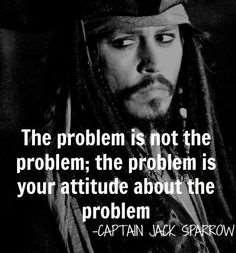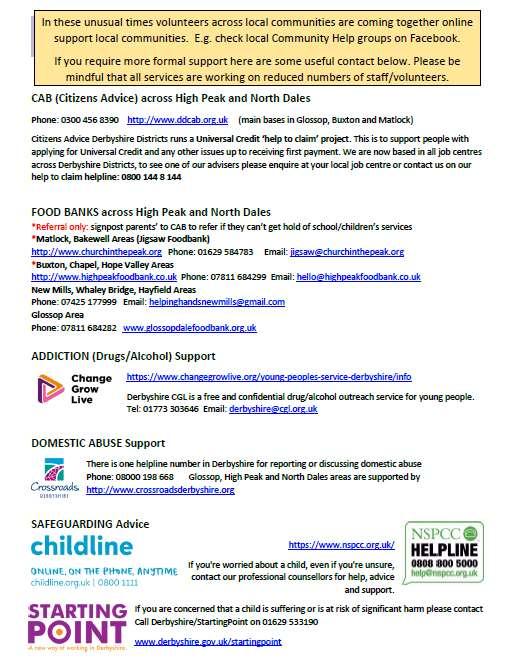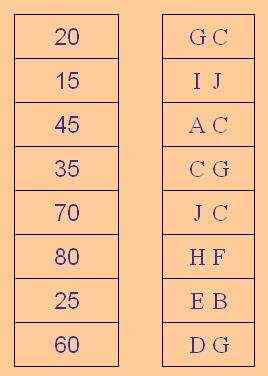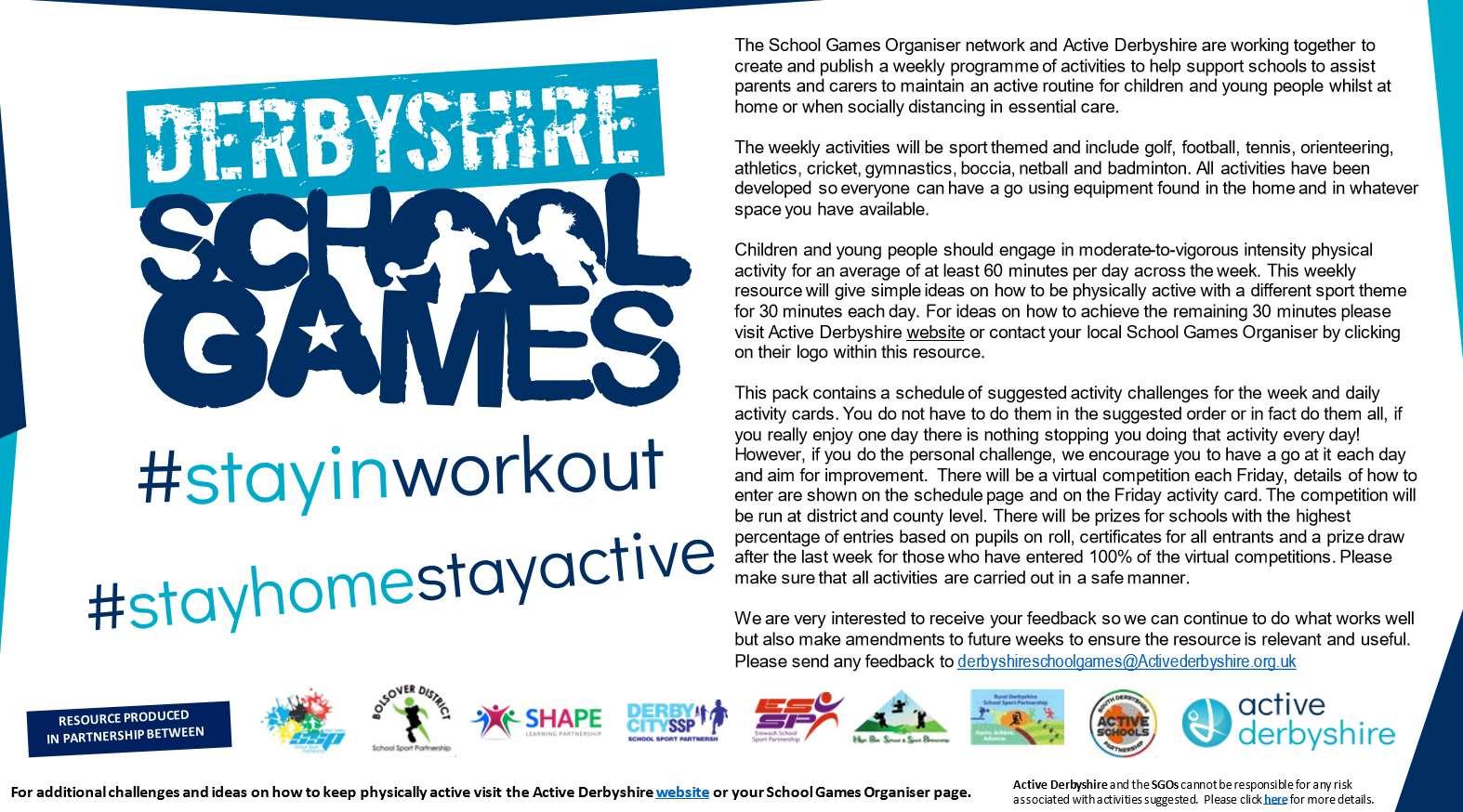
9 minute read
Updates for Parents/Carers
Year 10 assessments
As you are aware our planned Y10 exams at the end of April were postponed because of the current situation with COVID-19. In order to provide staff with an understanding of learning and progress during lockdown we have scheduled a Y10 assessment week starting on 15 June (third week back after half term).
Advertisement
Key information regarding Y10 assessment week:
The assessments set will be 'low stakes' - designed to give students the opportunity to have a go at an exam paper rather than to cause any stress They will encourage revision and recap year 10 work already covered They will give teachers an idea of what students understand and where the gaps are The assessments will be set as a paper via Show My Homework(SMHW) as per the weekly timetable work in usual slots in week commencing 15 June instead of ordinary lessons (no other work will be set this week to allow students to focus solely on these assessments) Each assessment will be a maximum of a 90 minute paper Instructions and guidance will be provided on SMHW with each paper set We would encourage students to sit each assessment under exam conditions for the time indicated by the teacher who has set the paper - this will give students the closest experience of sitting a GCSE paper. However, we obviously can't supervise these conditions so if they wish to use their books and notes this is fine. As stated above the most important thing is that students have an experience of completing an exam paper. Students may be set revision activities between now and then by their teachers and whilst students can also do some revision at half term if they wish to, please also encourage them to have a break and do other things during the holiday too.
This information has also been shared with year 10 students. Please discuss this with your son/daughter to ensure they are clear on the expectations. Your support during the assessment week in encouraging the students to stick to the timetable and to do their best would be greatly appreciated.
Please do not hesitate to contact Miss Hughes (Head of Y10) if you have any queries or concerns.
Thank you for your support.
Year 12 Exams
Thank you to parents/carers who are supporting Y12 students to replicate as close to exam conditions as possible from home during this first week of virtual exams. The process has started well and the second week of the exams will take place after the May holiday, ending on Friday 5 June.
We are setting these exams to ensure we keep up momentum and motivation in learning; to help be prepared as best we can for next year; and also because completing the exams in year 12 is often the trigger for moving on in learning to the next parts of the A Level specifications – which we don’t want to delay.
Remember, if students have any problems or technical hiccups during this process, please email the subject teacher so they are aware.
Reminder: Financial help from the ‘We Are Highfields Fund’ 2020
We wanted to remind parents/carers of the We Are Highfields fund that has been set up to support Highfields families affected by the Covid-19 outbreak to get food and connectivity. Please pass these details on to anyone who may need help but does not access school emails or the newsletter.
Application forms for the We Are Highfields Fund can be requested from the finance office either by email (finance@highfields.derbyshire.sch.uk); can be completed over the phone where you will be asked few simple questions to check eligibility (01629 832325); through your child’s year manager or the school website: http://www.highfields.derbyshire.sch.uk/pdfs/NewsPDFs/WeAreHighfieldsApplication.docx.
This is a hardship grant and is considered on a case by case basis. This grant scheme will be paid out until funds are exhausted. To be eligible you must be a parent/carer of a students at Highfields School and have savings of less than £1,000 per person or £2,000 for a family or couple (including rolling bank balance).
Food for Friends Partnership
More top tips on how to support your child with dyslexia and other SEND conditions …
My Disability is my Superpower!
Last week we looked at the work of Margaret Malpas MBE who identified 10 factors for success in life.
1. Determination: Essential – the number 1 trait for ANYONE to be successful, whether they are dyslexic or not 2. Self-esteem: You don’t need a huge amount of this, but you do need some 3. Passion: having a passion about a hobby, a skill, a sport… 4. Niche: Finding a niche, particularly with employment 5. Atypical problem solving: this is often considered a strength of dyslexics 6. Creativity 7. Empathy 8. Verbal influencing 9. Having good coping strategies 10. Having support from others: this is critically important. For example, it can be a parent/carer, a teacher or a mentor at work.
The spotlight today is focusing on some role models that are considered by society as ‘successful in life’ and turned their disability into their superpower!
How many famous faces do you recognise?
Lewis Hamilton, Formula 1 Driver
Orlando Bloom, Award Winning Actor
Orlando was diagnosed at aged 7 with dyslexia. His mum gave him the support and guidance that he needed through challenging times.

Jennifer Aniston – Award winning actor
Whoopi Goldberg – Award winning actor, talk show host and political commentator
Kiera Knightley – Diagnosed with dyslexia at age six. Successful award winning actor
Richard Branson, Founder of Virgin Enterprises
Will Smith, Award Winning Actor
“The keys to life are running and reading. When you’re running, there’s a little person that talks to you and says, “Oh I’m tired. My lung’s about to pop. I’m so hurt. There’s no way I can possibly continue.” You want to quit. If you learn how to defeat that person when you’re running. You will know how not to quit when things get hard in your life.”
Jeff Kinney, Children’s Author and Cartoonist
Diagnosed with ADHD, as a child and young adult he was often in trouble at school and at home. When asked if he had the choice, would he like to be rid of his ADHD, he commented, “Definitely not. I wouldn’t have been able to write the Diary of a Wimpy Kid series of books. It’s part of me. It’s who I am.” He drew cartoons as a way of coping with difficult situations as a child and he says that having ADHD helps him with his creative thinking.
Stephen Spielberg, legendary film producer and director
Being diagnosed with Dyslexia at age 60 was, “like the last puzzle part in a tremendous mystery that I’ve kept to myself all these years.”
Mollie King, member of The Saturdays Girl Band and now Radio 1 DJ

Up to the age of 10 years, Mollie thought, “I don’t know why I’m so stupid. That’s how I felt.” Now, her advice to young people is: Don’t be scared to ask for help Learn ways to help yourself Recognise your differences and celebrate them I have an almost photographic memory for navigation which I do see as a Superpower Know your strengths There will be so many things that you will excel in Go for your dreams Don’t let anything stop you!
John Lennon, member of The Beatles, songwriter, musician
Ingvar Kamprad Founder of IKEA
Steve Jobs Founder of Apple
Walt Disney, founder of the Walt Disney Empire
“If you can dream it, you can do it.”
Tom Cruise, award winning actor who enjoys doing his own stunts
“When I was about 7 years old, I had been labelled dyslexic. I’d try to concentrate on what I was reading, then I’d get to the end of the page and have very little memory of anything I’d read. I would go blank, feel anxious, nervous, bored, frustrated. I would get angry. My legs would actually hurt when I was studying. My head ached. All through school and well into my career, I felt like I had a secret. When I’d go to a new school, I wouldn’t want the other kids to know about my learning disability, but then I’d be sent off to remedial reading.”
Lee Byrne, International Rugby Player with 47 caps for Wales
“At school I was terrified of being asked to read aloud in class as I have real problems with reading and paying attention when reading a whole sentence. Audio books were great for me as well as trying to read autobiographies of sportsmen and women because I was really interested in them. I was at my happiest when playing rugby. It gave me discipline with diet, training and nutrition. And I needed to remember more than 50 different plays to the game when I can’t even remember my four digit pin number! I just stuck post-it notes up all around the house and focused for just 15 minute intervals and then had a short break.” “If I wasn’t dyslexic, I don’t think I’d be as good at rugby, as my spatial awareness is my superpower”

Jamie Oliver – Chef and government adviser on school meals
Adelle Tracey, Great British athlete - middle distance running
“I was home schooled in Jamaica as a child so when I came to Britain I knew that I would be behind everyone else. But I was REALLY behind. I was diagnosed at 8 years of age with dyslexia and at 13 / 14 years for dyscalculia (difficulties with numbers). My mum also suffers from these two conditions so she couldn’t help me.”
I had an overwhelming feeling of anxiety in the classroom. I don’t know my times tables and I still can’t tell the time with an analogue clock but my disabilities have given me my work ethic and my resilience when things go wrong. They are the key to my success.”
Albert Einstein, Nobel Prize Winner for Physics in 1921
In all walks of life, you will find strong, determined people with disabilities, making a difference.
What will you do?
I will leave you in the capable hands of Captain Jack Sparrow from Pirates of the Caribbean… Mrs Finney - SEND Teaching & Learning Coordinator Specialist Teacher








